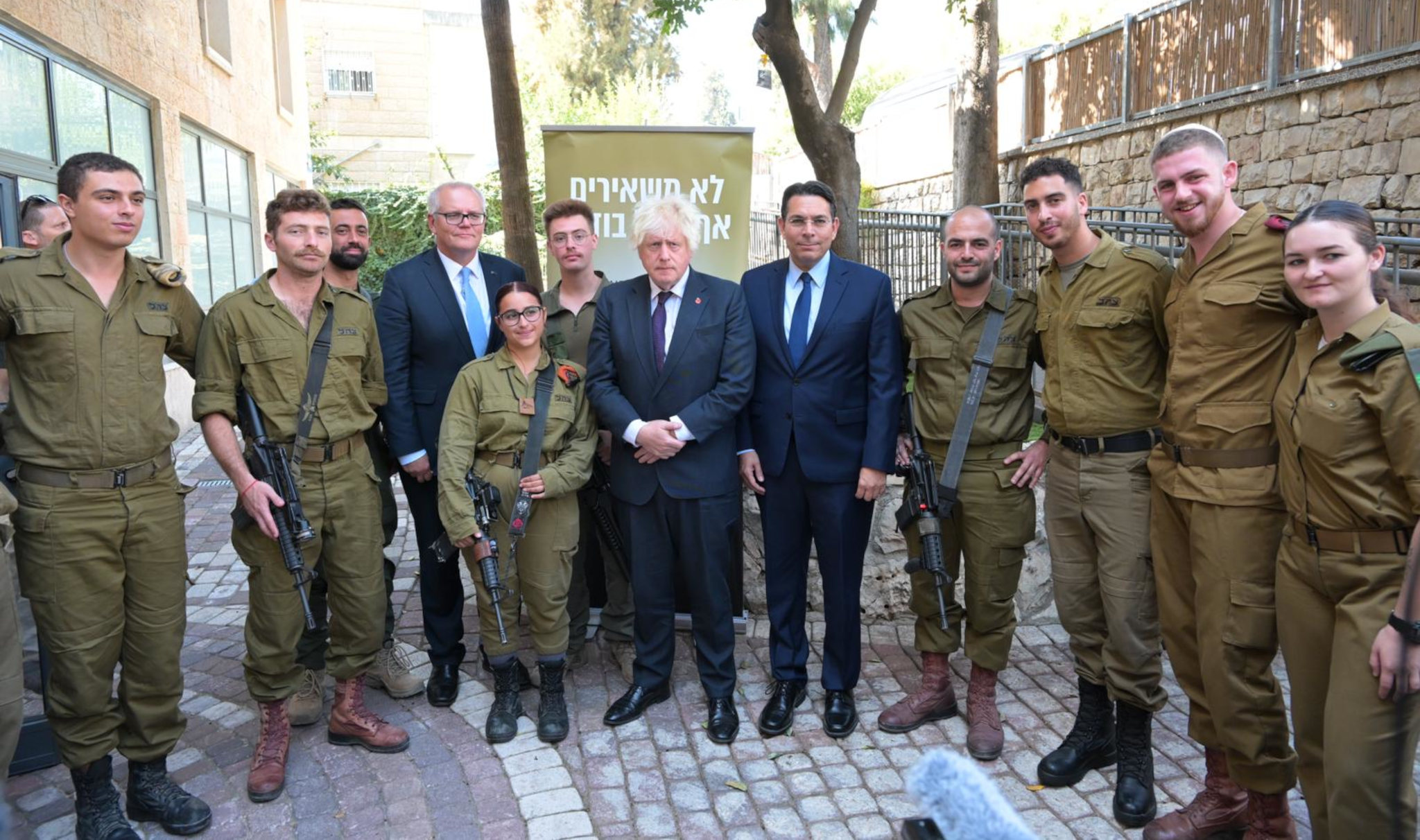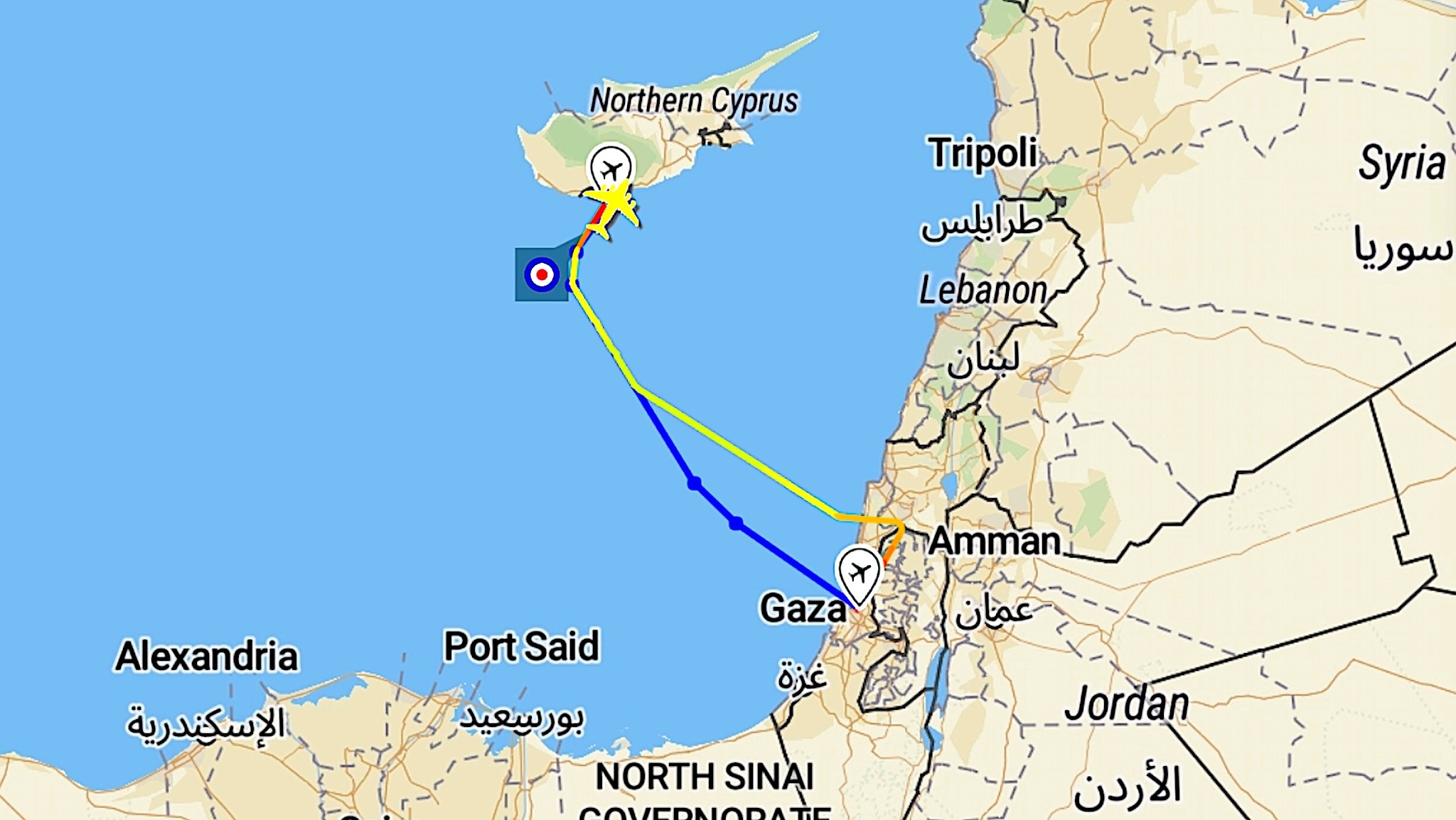After Hamas launched its surprise attack on Israel last month, it quickly emerged that a British man was among the 1,200 fatalities. Nathanel Young, a 20-year-old from London, was serving as a corporal in the Israel Defence Force (IDF).
His death shone a spotlight, briefly, on the fact that British citizens are willing and able to fight for Israel’s military. Boris Johnson underlined this fact when he met a group of them in Jerusalem last Sunday.
Praising their service, he shook hands with Sam Sank, originally from Harrow, who joined the IDF in 2009 as an 18-year-old. Sank told The Times that hundreds if not thousands of fellow Brits are currently serving in the IDF.
Such an arrangement would raise questions at the best of times. Even before the current conflict with Gaza, Israeli troops were illegally occupying land in Palestine and Syria. Sank personally served as a paratrooper in both places, according to a blog he wrote about his army career.
In May 2010, he admitted to guarding a religious Jewish settlement that was “beyond the ‘green line’,” referring to Israel’s border with the West Bank. The following year, he mused that “the borders are, to a degree, ambiguous” and said “the West Bank can seem like a bit of [a] madhouse but the IDF is still very coherent in its role of protecting Jewish inhabitants from any threat.”
He also lived on a settlement and worked at a military base in the Golan Heights, which Israel seized from Syria in 1967. The UK’s Conservative government reiterated to the UN in 2019 how it “did not recognise that annexation and nor do we today. Annexation of territory by force is prohibited under international law”.
‘Deafening silence’
Yet none of these violations seemed to bother Johnson as he met the British IDF members, focusing instead on his disgust at Hamas atrocities. The event was organised by the Lone Soldiers Center, a charity that supports thousands of immigrants in the IDF.
His visit came just days after the International Centre of Justice for Palestinians (ICJP) asked the UK Foreign Office for urgent clarification on whether such enlistment was lawful. They made the request “In light of the catastrophic situation currently unfolding in Gaza, with clear evidence that war crimes and crimes against humanity may already have been committed in Israel and the Occupied Palestinian Territory, and the real risk that further mass atrocity crimes may be imminent”.
Their communications officer, Jonathan Purcell, told Declassified: “It’s remarkable that Boris Johnson doesn’t seem to notice the irony of criticising civilian deaths whilst standing shoulder to shoulder with British-Israeli IDF reservists. He rightly spoke of the tragedy of innocent Israeli civilians dying but when it comes to Palestinian civilians, his silence is deafening.”
“Johnson may no longer be an MP, but his support of potential war criminals is a reckless use of his platform”
“Johnson may no longer be an MP, but his support of potential war criminals is a reckless use of his platform and a desperate attempt at distraction,” Purcell added, alluding to the Covid inquiry.
When asked for comment by Declassified, the Foreign Office would only direct us to its travel advice for Israel, which currently cautions against all travel to large parts of the country.
The Metropolitan Police, which is responsible for investigating war crimes, simply said: “Any referrals we receive in this regard will be assessed in line with the process agreed with the Crown Prosecution Service. Nothing further to add.”
The ICJP’s concerns are likely to encounter stiff resistance within Westminster. Lord Wolfson, a Conservative peer who served as a justice minister from 2020-22, told parliament that his son “has now made his life in Israel” and was doing military service there.
Home Secretary Suella Braverman, whose husband has lived in Israel, previously told the Jewish Chronicle, “We have close family members who serve in the IDF”. It is unclear if those relatives are British citizens.
When Liz Truss was foreign secretary, she famously encouraged Britons to join Ukraine’s international legion to fight against Russia’s invasion. Although cabinet colleagues distanced themselves from her remarks, Declassified revealed that the son of Helen Grant MP – another former Tory justice minister – was among those who had deployed to the war zone.
How can Britons join the IDF?
Jewish youths from foreign countries are allowed to enlist in the IDF as “tourists” and receive residence permits under Israel’s Mahal (overseas volunteers) scheme, according to its official website. Many choose to remain in Israel after their service and acquire citizenship.
The scheme is supported by various agencies such as Garin Tzabar, which has an office in London. It advertises how immigrants who join the IDF can earn almost twice as much as their domestic counterparts, partly due to grants from Israeli government departments.
Garin Tzabar did not respond to a request for comment about how many Britons it had helped join the IDF. However there has been a steady stream of recruits from the UK. A London mum whose son serves in the IDF told the Jewish Chronicle he was joined by “something like 50 to 80 frum [religious] boys from Golders Green”.
Among the most high profile is the IDF’s international spokesman, Lieutenant Colonel Richard Hecht, who emigrated from Scotland in the 1980s. He still retains a strong Scottish accent, and stunned a CNN anchor when he confirmed that Israel had bombed Jabalia refugee camp, where hundreds of Palestinian civilians have been killed. Hecht said it was the “tragedy of war.”
Other British expats to have joined the IDF include Major Keren Hajioff, who emigrated in 2009 aged 19. She served in the IDF’s spokesperson’s unit during the 2014 bombardment of Gaza and last year became a special adviser to Israel’s then prime minister Naftali Bennett.
Another British recruit, Corporal Lian Harush, alleges she was nearly stabbed by a Palestinian teenager in 2021 while guarded an illegal settlement in the West Bank. Her commander shot the boy dead.
‘Loophole’
Criticism of the scheme is not confined to the ICJP. Former Conservative Party chairwoman, Baroness Sayeeda Warsi, has called for British citizens to be prosecuted if they join the IDF.
Warsi served as a Foreign Office minister before resigning over David Cameron’s stance on the 2014 Gaza war. She believes Britain is guilty of double standards by criminalising Muslims who become foreign fighters, while allowing British Jews to join the IDF.
“Belonging to Britain for Muslims is a thing we talk about a lot,” she told Middle East Eye. “We don’t talk about it in relation to other communities. We accept that other communities hold multiple identities. Let’s just shut down this loophole. If you don’t fight for Britain, you do not fight.”
“Former Conservative Party chairwoman, Baroness Sayeeda Warsi, has called for British citizens to be prosecuted if they join the IDF”
People who fight for a foreign army are often viewed as mercenaries, and would meet the dictionary definition. However as Declassified has long reported, the UK has no effective anti-mercenary laws and tends to prosecute foreign fighters on an ad hoc basis, depending on whatever geo-political interests are being pursued by the government of the day.
The UK even tried to thwart attempts at the United Nations to craft a ban on mercenaries. The only international law concerning mercenaries that Britain has signed is Article 47 of Additional Protocol I to the Geneva Convention.
It was adopted in 1977 as “countries attempted to create a fine distinction between those classified as mercenaries and other actors, essentially with the aim of retaining the right to recruit, train, finance, and use mercenaries with impunity,” according to a report presented last month to the UN General Assembly by its working group on mercenaries.
The group criticised how “Article 47 as adopted by States deliberately establishes a complex and hard to meet definition of mercenary, allowing for easy circumvention by States, mercenaries, and mercenary-related actors, and does not criminalize the phenomenon.”
Article 47(e) defines a mercenary as someone who “is not a member of the armed forces of a Party to the conflict”, which excludes expat soldiers who are enrolled in formal army units, such as Gurkas or French Foreign Legion. The UN’s working group on mercenaries said that formulation “leaves it open for States to circumvent Article 47 by incorporating troops hired abroad into its own armed forces without them being classified as mercenaries”.
While Britons who join the IDF might not meet the Geneva Convention’s entire definition of a mercenary, they do meet certain aspects of the criteria. The fact that some are paid more than their Israeli counterparts appears to satisfy Article 47(c), which says mercenaries may receive “material compensation substantially in excess of that promised or paid to combatants of similar ranks and functions in the armed forces of that Party”.




